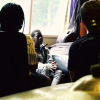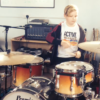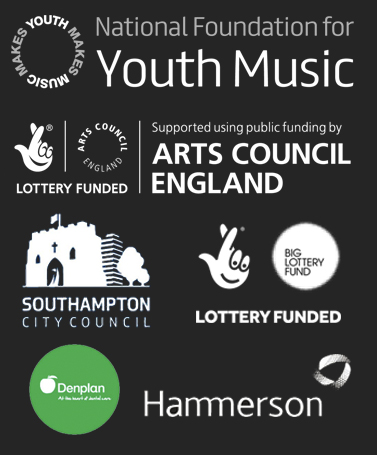For several months, my colleague Jim and I have led songwriting workshops to Breakout youth group. The young adults that attended the sessions ranged between the ages of 11-23 and were members of the LGBT community. We delivered monthly sessions in Southampton, Eastleigh and Basingstoke with approximately 60 young people involved in total.
The aim of these sessions was to write and record an album that explored the themes of sexuality and of self-expression. The album consisted of 12 tracks that offered plenty of variety (e.g. band performances, poetry reading, singer/songwriters). The album will soon be physically available to those that participated in the project and will be digitally accessible to everybody else on BandCamp shortly.
But aside from the creation of this albums’ worth of original material, the sessions proved to be an immensely eye-opening experience for me. We were working with some of the most emotionally mature, strong, independent and inspirational young people I had ever met.
In a world plagued by prejudice and judgement, growing up is never an easy thing but some of these individuals I believe have had more life experience already than some people get their entire lives. From birth, we are assigned a sex and expected to conform to the demands and expectations of being a boy or a girl. That label is thought to define who we are. But what if it is not that simple? What if you don’t feel like you’re in the right body? What if it’s not that you just don’t feel like a boy or a girl but that you know you simply are not what you are ‘supposed’ to be? Some of these young people live and experience this reality on a daily basis. Some have supportive networks, others are not quite so fortunate.
For Jim and I, we were able to develop close relationships with these young people, explore the day-to-day challenges they faced and provide them with a platform for free-expression. Often, they told us that the provision of these workshops and this opportunity for them to express themselves through song was something that they looked forward to each week. One person in particular mentioned that it was the only time and place that they felt they could be bothered to talk to anyone, that it was the only place they felt they were truly heard, accepted.
The fact that acceptance seemed to be such a rarity in these young people’s lives really upset me. There was no reason as to why this should be the case as they were all particularly loving, friendly, empathetic people. To me, gay or straight, male or female, wishing to avoid such labels entirely, we should be able to be who we want to be for we all live our own lives and not the lives of others. It seemed clear to me that these young people were not the problem.
Fortunately, music helped us to explore this reality and explore this desire for acceptance. Jim and I learnt a lot through this experience, from things as basic as new terminology (i.e. non-binary, gender-fluid) to things far more significant (concerning aspects of these young people’s personal lives). But something that we found particularly fascinating and perhaps most challenging to address were pronouns. Instead of referring to he/she/his/her, we were encouraged to use they and them and address people by name. This was because some individuals were non-binary, and preferred to avoid the label of either sex. Others were gender-fluid, with their preference fluctuating on a sometimes-regular basis. Although this was new and difficult to embrace at first, it was clear to us that by avoiding sex-specific pronouns and by making more of an effort to address individuals by name we were able to make the young people feel more comfortable in our presence and as a result, they were happier to engage in the activities of the sessions. It had not occurred to me just how difficult it is to be labelled as man or woman, nor had it previously occurred to me that maybe people just don’t want to be one or the other. I would not be surprised if non-binary sexuality is often the result of frustration and the desire to escape the conformity of sexuality. Why should things be so linear? Why do we have to be a certain way? Can we really help it if something does or doesn’t feel right?
To conclude, it seems that the concept of gender identity is not quite as straightforward as some people make it out to be. When we begin to make categorisations (i.e. Man or woman, gay or straight), we begin to depersonalise individuals, remove their characteristics, traits and overlook what makes that person truly them. Music is simply a tool that can be used to explore and challenge the restrictions of this. It acts as a means of expression and allows us to communicate with each other in inexplicable ways. With such ignorance in the world, we need to rely on these alternative forms of communication if we are to truly understand, appreciate and accept one another. A lot goes on beneath the surface for a person. Discomforts, fears and anxieties cannot be left in the dark and require somebody to cast light upon them. If music is the key, then so be it.






